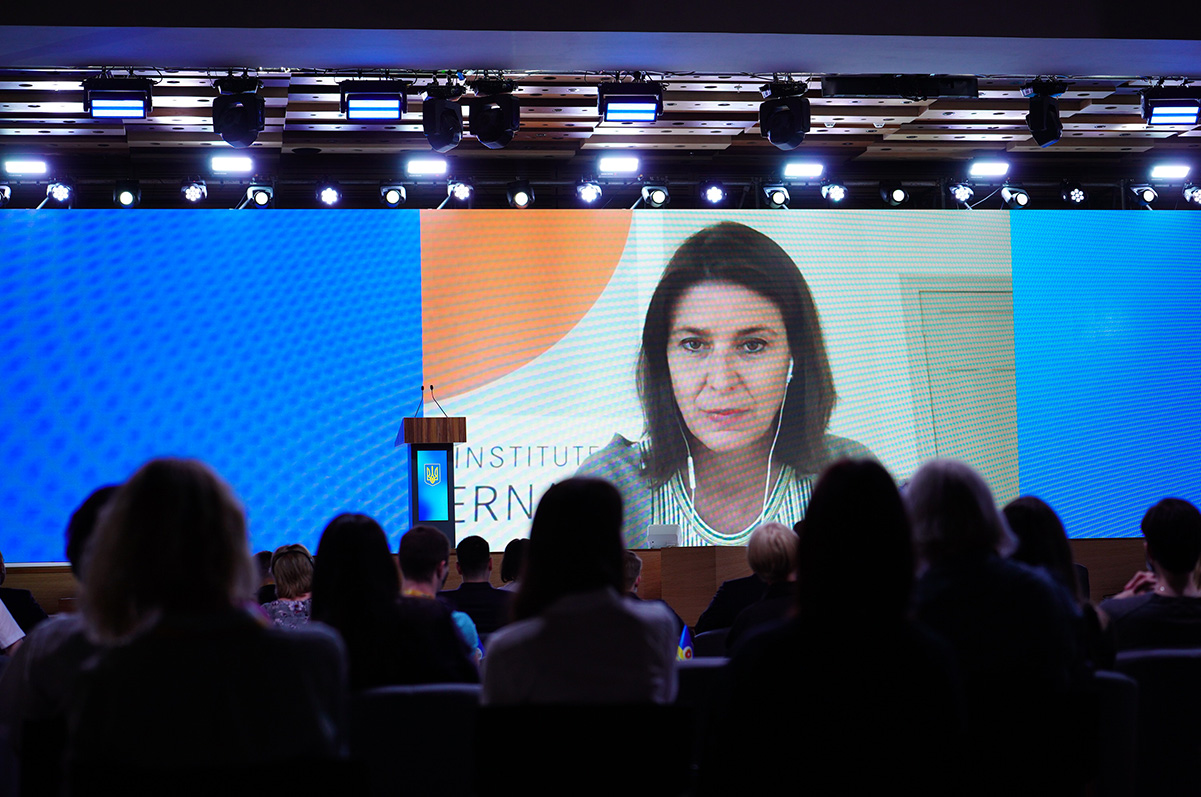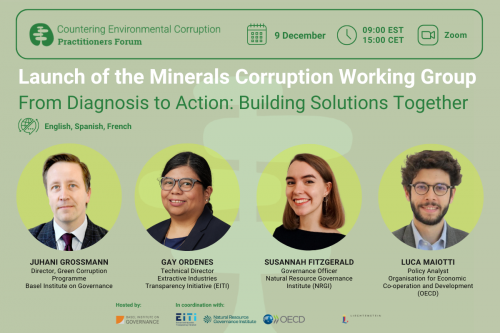A make-or-break moment: Gretta Fenner urges Ukrainian political leaders to speed up asset recovery and remove obstacles to combating corruption

At a high-profile speech at the Ukraine 30 Forum last week, the Basel Institute's Managing Director Gretta Fenner emphasised that it is critical that Ukraine swiftly and professionally concludes the asset recovery processes started after the Revolution of Dignity. She also urged the country to fully empower its anti-corruption institutions and reduce the hurdles that have been put in their ways. High levels of corruption continue to drain the country's resources and threaten its democracy.
Initiated by President Volodymyr Zelensky in February 2021, the Ukraine 30 Forum is a platform for discussion between the public and private sectors, civil society and other experts in the run-up to Ukraine's 30th anniversary of independence on 24 August 2021. Since February, the forum has tackled a range of critical topics including coronavirus, the justice system, education, digitalisation and national security.
Gretta spoke immediately after President Zelensky and Prime Minister Denys Shmyhal on 15 June, on the second day of the Forum's special session on "An economy without oligarchs". Her full speech is below in English and can be viewed on YouTube here in Ukrainian and here in English (starting at minute 30:30).
Mr President
Prime Minister
Excellencies, ladies and gentlemen
And most importantly: Dear friends from Ukraine
It is a privilege to speak to you this morning and to be part of Forum 30 which leads up to the celebration of 30 years of independence of Ukraine in August.
I am sorry I cannot be with you in Kyiv today, especially as I was in your beautiful capital just last week. But let’s come to the topic of today: Corruption and asset recovery. Talking of these topics in the context of celebrating your country’s independence is very pertinent, because independence and the fight against corruption are closely entwined.
- If a country is captured by vested interests and corrupt crime groups, then democracy is at stake, and I believe you would all agree that democracy has been the goal of Ukraine’s independence.
- Second, it is crucial that anti-corruption institutions can act independently. If they are at risk of undue political or economic interference, they lose their ability to effectively combat corruption.
- Third, when grand corruption is widely present, criminals steal large amounts of public assets. As a result the country lacks resources to invest in important public services and infrastructure. The country and its people are impoverished, and they become dependent on foreign aid.
Reducing corruption and getting stolen assets back is important for Ukraine because the country urgently needs this money to build schools, hospitals, roads, and to invest in job creation.
But it is important for another reason too: Asset recovery is considered a particularly powerful weapon against corruption. And when I say corruption here, I mean grand corruption, the kind that siphons of millions and billions from your country.
If law enforcement is successful in depriving criminals of their stolen assets, the crime of corruption is all of a sudden much less attractive. And while it is important to put corrupt people in prison when found guilty, it hurts them a lot more if you also take their money away.
The efforts of Ukraine since 2014 to recover stolen assets are therefore very important from both a social and economic development perspective, and from a criminal justice perspective.
My organisation, the Basel Institute on Governance, has had the privilege of supporting Ukraine in its efforts to recover stolen assets since 2014, when very shortly after the Revolution of Dignity, the Office of the Prosecutor General asked us to assist with finding and recovering the money that was stolen by former President Yanukovych and his allies. This cooperation was reinforced with the signing, last year at the occasion of the visit to Ukraine of then Swiss President Simonetta Sommaruga, of a tripartite agreement between Switzerland, the Office of the Prosecutor General and NABU, underscoring the cooperation of Switzerland, Ukraine and my organisation to recover stolen assets.
Since 2014, Ukraine has recorded progress, but the progress has sometimes been slower than we would hope.
The first very positive development immediately after the Revolution of Dignity was the international reaction. Switzerland, which by the way finances our work in Ukraine, the European Union and other important jurisdictions, have immediately frozen assets suspected of having been stolen by the regime of former President Yanukovych. The intention of this international action to freeze these assets was to give Ukraine time to investigate the underlying crimes, to prove that the money stems from corruption, and ultimately to confiscate it so that it can be returned to Ukraine.
But these freeze orders are not open-ended. And foreign countries cannot return the money to Ukraine without the help of Ukraine. Through our work, we were able to help advance the cooperation between Ukraine and the countries where assets have been frozen. These countries have provided Ukraine with information about the bank accounts and with other evidence.
But now the ball is largely in Ukraine’s camp. It’s the Ukrainian institutions that need to finish investigating and then prosecute the cases, and the Courts that need to confirm the criminal origin of these assets. Only then can the other countries release the funds and the money can be returned to Ukraine. And with that money, schools can be built, or roads, or hospitals.
Time is of the essence now; we may have another two or three years until most freezes will expire. That means that Ukrainian institutions have to work at full speed, and have to be allowed to do so, so that we can see successful prosecutions and confiscations in Ukrainian Courts.
For this, Ukraine does have the necessary institutions, and this is another positive development that has happened since the Revolution of Dignity. In addition to the OPG, these include, as you know well, the National Anti-Corruption Bureau and the Special Anti-Corruption Prosecutor, two institutions with which we work closely and who are very important for this country. There is also ARMA and the National Agency for Corruption Prevention, and the State Bureau for Investigations. In this context I am particularly pleased to confirm that we have just signed a cooperation agreement with SBI last week when I was in Kyiv. And of course, very important, the High Anti-Corruption Court.
These institutions are all very important, but they have an incredibly difficult job. Investigating cases of grand corruption is extremely challenging; expertise in the field of asset recovery is very rare; and the criminals are using their still vast resources to pay for some of the most experienced defence attorneys to make the job of NABU, SBI or OPG ever more difficult.
On top of that, it has been hard to watch how over the years, a whole range of home-grown obstacles was put in the way of these critical institutions and how they continue to suffer greatly from instability brought to them from the outside:
In the seven years that we have been supporting Ukraine, we have worked with five Prosecutors General, some of which were more, some less reform oriented. This is a real problem for the stability of this key institution, and has at times definitely had a negative impact on its performance.
Adding to this problem is the fact that key anti-corruption institutions have not had a chief for a prolonged period. The positions of Heads of SAPO, of ARMA and of SBI have been vacant for far too long, and the selection process for Head of SAPO is in serious trouble. This is not to suggest that the Acting Heads of these institutions are not doing a good job; they are doing a very good job in many cases. But it adds to the instability, and it puts into question the will of some to enable these institutions to be effective.
And last but not least, as you know, there have been something like 18 attempts to remove the current Director of NABU from his position. And nobody will make me believe that this is because he is so bad at his job; rather, I would argue it is because he is a threat to those who have reason to fear him and NABU.
In addition to that, we have had one backlash after the other when it comes to reforming Ukraine’s legislative framework.
- The decision by the Constitutional Court to rescind the asset declaration law is very problematic for example.
- The law on illicit enrichment, which was passed in Parliament just recently, is a poor replacement for the previous law. It has serious weaknesses, as confirmed by the Venice Commission, and it will make it extremely hard for investigators and prosecutors in their efforts to stem out corruption.
- And finally, ample evidence of serious corruption in the Ukrainian Court system may well be the final straw to Ukraine’s efforts to recover the billions of hryvnia that have been stolen, stolen from Ukraine, stolen from the people of Ukraine.
So this is a make or break moment. If we are not successful in recovering these stolen assets, then people will lose patience, they will lose hope, and they will lose trust in this country’s institutions, again. Because it will seem to people that the corrupt continue to get away with their crime. And it can seem like an invitation to others to also steal.
Corruption may seem only one of the many problems this country has to grapple with. But you should remember that corruption is at the heart of pretty much any other problem you are facing. Corruption fuels conflict and is known as a serious threat to national security; corruption fuels organised crime; corruption destroys the health system; corruption leads to poor education; corruption leads to poverty. It is no exaggeration when we say that in many ways, corruption kills.
Mr President, Prime Minister, ladies and gentlemen. This is a critical time.
The international community, and my institution included, continues to support you in your efforts to fight corruption and recover stolen assets. But we must see sincere effort in Ukraine; we must see that there is an end to the undermining of the independence of key institutions; we must see these institutions with strong leadership; we must urgently re-instil independence, impartiality and professionalism in the Court system; and we must pass legislation that is up to international standards and that can work, not legislation that undermines the anti-corruption drive.
This is what we hope to see from the politicians in this country, and I sincerely hope that they will show that they have the best interests of the country – and of the Ukrainian people – at heart. I trust and know that you do, Mr President, Prime Minister.
We are here to help, and together with our partners in NABU, at OPG and at SBI, with our partners in Switzerland and across the world, we will continue to stand by your country’s side to end impunity for corruption and hopefully return many of the stolen assets to Ukraine, so they can be used for the benefit of the people of Ukraine.
I thank you.




